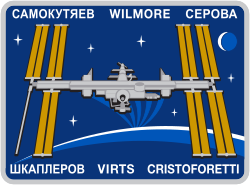Expedition 43
| Expedition 43 | |||
 | |||
| Uppdragsstatistik | |||
|---|---|---|---|
| Rymdstation: | ISS | ||
| Start: | 11 mars 2015[1] | ||
| Slut: | 11 juni 2015[1] | ||
| Antal besättningsmedlemmar: | 6 st | ||
| Transport | |||
| Uppskjutning: | med Sojuz TMA-15M, Sojuz TMA-16M | ||
| Uppskjutningsplats: | Kosmodromen i Bajkonur | ||
| Landning: | med Sojuz TMA-15M, Sojuz TMA-16M, Sojuz TMA-18M | ||
| Landningsplats: | Kazakstan | ||
| Kronologi | |||
| |||

Expedition 43 var den 43:e expeditionen till Internationella rymdstationen (ISS). Expeditionen började den 11 mars 2015 då delar av Expedition 42s besättning återvände till jorden med Sojuz TMA-14M.
Gennadij Padalka, Michail Kornijenko och Scott J. Kelly anlände till stationen med Sojuz TMA-16M den 28 mars 2015.
Expeditionen avslutades den 11 juni 2015 då Anton Sjkaplerov, Samantha Cristoforetti och Terry W. Virts återvände till jorden med Sojuz TMA-15M.
Expedition 43 var första etappen i Michail Kornijenkos och Scott J. Kellys ett år långa vistelse ombord på rymdstationen.
Besättning
| Position | Första delen (11 - 28 mars 2015) | Andra delen (28 mars - 11 juni 2015) |
|---|---|---|
| Befälhavare | Hans andra rymdfärd | |
| Flygingenjör 1 | Hans andra rymdfärd | |
| Flygingenjör 2 | Hennes första rymdfärd | |
| Flygingenjör 3 | Hans femte rymdfärd | |
| Flygingenjör 4 | Hans andra rymdfärd | |
| Flygingenjör 5 | Hans fjärde rymdfärd | |
Referenser
- ^ [a b] NASA's Space Station Expedition 43, läst 3 september 2016.
Externa länkar
| |||||||||||||||||||
Media som används på denna webbplats
The hexagon (six-sided) shape of the Expedition 43 patch represents the six crew members living and working onboard the orbital outpost. The International Space Station (ISS) is portrayed in orbit around the Earth, representing the multi-national partnership that has constructed, developed, and continues to operate the ISS for the benefit of all humankind. The sunrise marks the beginning of a new day, reflecting the fact that we're at the dawn of our history as a space faring species. The moon and planets represent future exploration of our solar system, for which the ISS is a stepping stone. Finally, the five stars honor the crews who have lost their lives during the pursuit of human spaceflight.
The rectangular-shaped design portrays the International Space Station orbiting planet Earth with its solar array wings spread wide. Facing the sun with the lower left outboard solar array feathered, the left array portrays a prominent number "4" and the fully deployed arrays on the right form the Roman numeral version of "2," which signifies the two increment crews which, together, comprise the six-member international Expedition "42" crew. The crew and all supporting personnel around the world are also represented by the six stars adorning the sky around the complex.
This is the insignia for the Expedition 44 mission.
- The International Space Station is positioned in the foreground poised to study Earth, the sun and cosmos that lie beyond. Two members of the Expedition 44 crew will spend a full year on the ISS - providing valuable experience for future long duration missions into deep space. The 12 Earths represent the planet's position around the sun over the course of that year. Four of the Earths are silhouetted in sunlight representing the four month duration of Expedition 44. The nine stars in the background represent the nine individuals that will visit and work on the ISS during the course of the expedition, including the six-member crew, whose names are inscribed around the patch's border, and the three-person Soyuz "taxi" crew. The use of ellipses and circles throughout the patch reflect a theme of "completion" or "return," as investments made in this orbiting laboratory return benefit to the Earth and its inhabitants.
Expedition 43 crew members take a break from training at NASA's Johnson Space Center to pose for a crew portrait. Pictured from the right are NASA astronaut Terry Virts, commander; along with Russian cosmonaut Mikhail Kornienko, European Space Agency astronaut Samantha Cristoforetti, Russian cosmonaut Anton Shkaplerov, NASA astronaut Scott Kelly and Russian cosmonaut Gennady Padalka, all flight engineers.






